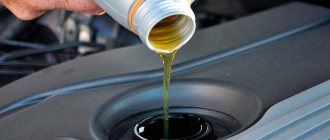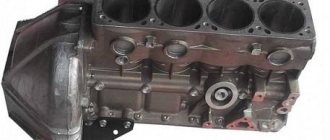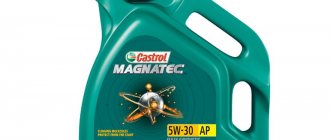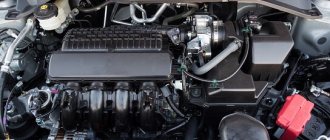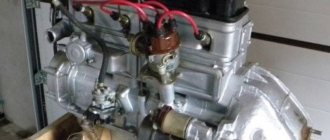Hello, today we will show you how to independently replace the oil filter and engine oil on a VAZ 2105, 2107. Engine oil is changed on average once every 10,000 km and it is changed together with the filter, otherwise the new oil will be of little use. The maximum you can drive without changing the oil is 15,000 km, but this is already the limit; if you drive longer, the engine will begin to “die.” Why you need oil in the engine, you can read Oil needs to be changed with a hot, switched off engine.
First, remove the oil filler cap, this is necessary so that the oil does not “gurgle” when it drains
Now use a large hexagon to unscrew the drain plug on the engine crankcase and drain the oil into a previously prepared container
We wait for as much oil as possible to drain for 5-10 minutes and screw the drain plug into place. Now you need to change the oil filter. First, try to unscrew the oil filter by hand, if it doesn’t work, then use a special puller, and if there is no puller, then you can pierce the filter with a screwdriver at the base and use it to unscrew it
Next, we screw in the new oil filter; it’s best to screw it in by hand so as not to overdo it and strip the threads. We pour new engine oil through the oil filler neck and at the same time check its level in the engine using the dipstick. After you have filled the oil to the max mark on the dipstick, start the engine for a few seconds and after waiting 5 minutes, check the oil level again, as the oil spreads throughout the engine and the oil filter fills up, it may need to be topped up.
One of the main types of maintenance work for VAZ cars, no matter what model and year of manufacture, is the replacement of working fluids, primarily oil. Moreover, a change of lubricants should be carried out in all components of the car where the lubricant is used. First of all, these are the engine and transmission parts.
Since in our latitudes there is a seasonal change in climate with strong temperature changes, the question often arises of what kind of oil to pour into a VAZ engine in winter, because the change of season also affects the properties of the lubricant. And this issue should be somewhat understood.
Viscosity
Let's start with the fact that one of the main parameters of a lubricant intended for filling into power plants is its viscosity. This characteristic determines the fluidity of the oil under different operating conditions. It must be fluid while cold (to ensure ease of starting the engine) and maintain viscosity, that is, not drain from the surface, after heating. It is the viscosity of the oil that is one of the main criteria when choosing. To designate lubricants by viscosity, a whole classification has been introduced - SAE.
According to it, all oils are divided into:
- Summer;
- Winter;
- All-season;
The first two options are relatively rare in our country; they are more intended for use in conditions of year-round stable temperatures. For the summer version, the main criterion is the preservation of viscosity at high temperatures, and fluidity at low temperatures is practically not taken into account. And everything is exactly the opposite for the winter version.
Since we have large seasonal temperature changes, it is simply not practical to use summer and winter oils separately. Therefore, it is more rational to use all-season lubricants. Moreover, they also come in different viscosities, so you should also choose the right engine oil for the winter in your VAZ.
To indicate the viscosity of all-season motor oils according to the SAE classification, an index consisting of numbers and letters is used. Examples of such markings are 5W-40, 0W-30, 10W-50, etc. The first part of the marking indicates viscosity values at low temperatures. Essentially, this indicator indicates at what minimum temperature threshold the lubricant will remain fluid enough for the oil pump to “push” it through the system. And in this case, the lower the number of the first part of the marking, the greater the frost the lubricant will withstand. Thus, oil with an index of 5W will remain fluid at temperatures down to -30 degrees, but for 15W the maximum temperature threshold is already -20 degrees C.
The second part of the marking indicates viscosity at high temperatures. Here the opposite is true: the higher the number, the higher the viscosity after heating.
To select the viscosity of engine oil for the winter for a VAZ-2114 or any other model, you just need to determine the temperature in different seasons. So, for northern latitudes, you should first of all be guided by low-temperature viscosity, that is, by the first part of the SAE index. If in winter the temperature drops to -30 degrees. C and below, it is better to use 0W or at least 5W oils. Using a lubricant with a higher index will lead to the fact that in severe frosts the oil will be so thick that the starter will not be able to crank the crankshaft. But for southern latitudes, you should focus more on the second part of the index, that is, high-temperature viscosity.
For latitudes with a temperate climate, winter oil for the VAZ-2106 (in general, it does not matter which model) you will have to find a compromise so that the lubricant remains liquid in winter and viscous in summer. The optimal oil for such a climate is 5W-40.
What oil to use for the VAZ 2105 engine
Original
VAZ-2105 owners use mineral, semi-synthetic or synthetic motor oil with different viscosities. Semi-synthetics are considered the most popular for this model. Viscosity is selected depending on temperature conditions. For example, for year-round operation, a 10W-40, 10W-30 or 5W-40 all-season oil is recommended. In the winter season, it is better to fill in 0W-30, 0W-40 or 5W-30, and in the summer you can opt for 20W-40 or 25W-50.
Unoriginal
Owners of VAZ-2105 cars prefer inexpensive motor oils from domestic brands Lukoil, Rosneft, G-Energy and Gazpromneft. When choosing a suitable product, it is necessary to take into account the API approval, which is selected depending on the year of manufacture of the car, as well as the type of internal combustion engine. For example, for a gasoline VAZ-2105 produced in 1980. All-season mineral oil with parameters 15W-20 and API-SG is suitable. For cars of the 2010 model year, semi-synthetic API-SL is recommended. Below are the best options for analogue motor oils for the VAZ-2105.
- ZIC X5 10W-40
- Lukoil Lux 10W-40
- Mobil Super 3000 5W-40
- G-Energy 10W-40
- Eneos 10W-40.
Oil type
We looked at what kind of oil to pour into a VAZ 2110 in winter based on such a parameter as viscosity.
But the type of lubricant should also be taken into account. There are three in total:
- Mineral;
- Synthetic;
- Semi-synthetic;
Mineral oil for winter VAZ-2109
- the worst option. Such a lubricant made by processing petroleum products is characterized by insufficiently good performance indicators, especially low-temperature viscosity. That is, its thickening threshold is much higher than that of other types of oil. But here it is worth noting that such oil for use as a lubricant is practically never found. But it is often used as a basis for flushing liquids.
Synthetic oil
– one of the most optimal options for power plants of modern cars. It is obtained by synthesis, during which certain parameters of the lubricant are set, including viscosity. Therefore, when deciding which oil to pour into a VAZ-2114 in winter, preference should be given to synthetic oil.
Polysynthetic
is a mixture of mineral and synthetic oils. In terms of performance indicators, it is inferior to “synthetics” (but at a lower price), but superior to “mineral water”. Therefore, using such oil in the VAZ-21083 engine or models of the classic family is a completely acceptable option.
It is these two criteria - viscosity and type that should be taken into account when determining which oil to fill in the VAZ-2115 or any other model for the winter.
Naturally, you should pay attention to the manufacturer. You should not buy lubricant from dubious places of sale or from little-known manufacturers. When choosing oil, it is better not to skimp.
Finally, let's take a look at the transmission. In VAZ classic models, lubricant is poured into the gearbox and gearbox, and starting from the VAZ-2108 model and higher - only in the gearbox (they do not have a gearbox). Moreover, these units use a special oil - transmission oil. This lubricant does not require replacement as often as power plant lubricant, and the general requirements for it are much lower.
When choosing VAZ-2107 transmission oil for the winter, you don’t really need to take into account the nuances. Transmission elements use oils with SAE classification index 75W-85, 80W-90, etc. It is poured into both the gearbox and gearbox.
Oil change intervals and vehicle preparation
How often is the engine oil changed on a VAZ 2103? Let's pay attention to a few points:
- If the oil was filled in after a major overhaul of the engine, it should be changed after 1 thousand kilometers. This is done because during break-in, intensive wear of engine parts occurs - the connecting rod-piston group and other parts.
- The usual oil change on Zhiguli engines is carried out during the period of 8-10 thousand kilometers or after 2 years, if the car has not been used, the lubricant will simply lose its properties.
- If mineral motor oil was poured into the engine, it should be replaced earlier.
- Unsuitable oil has a dark color - black, gray. This indicates that it contains a large amount of carbon deposits and other harmful substances and signals the need for replacement.
What does preparing a car for an oil change include? Let's look at it in order:
- Of course, purchasing oil and filter.
- The condition of your car's engine is satisfactory. If the engine is “consuming” oil or if traces of leaks are visible on the block, then it would be advisable to first repair the engine to eliminate all the shortcomings.
- Warming up the engine. Hot oil drains better - an indisputable fact. Before changing the oil, you should drive it for about 10 kilometers.
- Find a hole or overpass.
If you have a hole in your garage, that's just great. If not, then you will have to work hard and find these objects. They are the most convenient way to change the engine oil of a VAZ 2103.
- And, of course, a tool.
Video - Which car oil to choose for the winter?
“Seven” from VAZ is one of the longest-living record holders in our automobile industry. Since the release of the first copy in 1982, it has not left the assembly line for 30 years. The model was positioned as a luxury version of the VAZ 2105 with a more powerful engine. Otherwise, the “seven” was distinguished by comfortable seats, a redesigned dashboard and a lot of chrome in the trim. Until 2000, the VAZ 2107 was equipped with a 1.5-liter carburetor engine, after which it was equipped with injection units of the same volume.
Engine life depends greatly on the quality and type of oil used. What kind of oil to fill in VAZ 2107
? The simple answer to this question is simple: “You must use the oil recommended by the manufacturer.” But this issue deserves more detailed consideration.
Engine tuning 2105
How to increase the power of the 2105 engine .. just like on the 21011, the bore for the piston is 82mm, otherwise all movements are described in the article “Tuning the 2101 engine”, the motors repeat each other 1 in 1, the modification of the VAZ 2105 engine is the same.
The VAZ Seven (2107), produced in the USSR and Russia for thirty years (from 1982 to 2012), was at one time considered a car of increased comfort and elegance. The seven differed favorably from its prototype VAZ-2105 with a stronger carburetor engine (77 horsepower and a volume of 1.5 liters). The interior is decorated with comfortable chairs with high headrests, a modified instrument panel, and an abundance of chrome and decorative trim parts for the body and interior. Since the beginning of 2000, injection units began to be installed on the VAZ 2107.
The car, which has become a classic of the domestic automobile industry, is still not uncommon on the roads of Russia and neighboring countries. Which, in principle, is not surprising given that it was discontinued only four years ago, and due to its simplicity and reliability, the service life of this machine with proper care is quite long.
The more pertinent is the question of VAZ-2107 owners: how much and what kind of oil should be poured into its engine?
Classification of motor oils
The manufacturer's recommendations do not regulate the type of oil applicable to the "Seven" engine. Mineral, synthetic and semi-synthetic oil can be poured into the engine if it meets the quality requirements.
Motor oil canisters are marked (for example, “API SJ” or “API SG/CD”), which informs about the quality of the product. When choosing oil, this is what you should pay attention to.
The abbreviation API ( American
Petroleum Institute )
means “American Petroleum Institute.” This is an American non-governmental organization that provides regulation of issues related to the gas and oil industries. One of the areas of API's work is the development of standards and recommended practices for the oil and gas industry.
Motor oil is standardized according to the following indicators:
- toxicity;
- washing ability;
- corrosive activity;
- effectiveness of protecting parts from friction;
- the amount of deposits remaining on parts over the period of operation;
- temperature characteristics.
The letters “S” and “C” mean that the oil is intended for gasoline or diesel engines.
The letter after "S" or "C" indicates the quality of the engine oil's performance characteristics. The markings are in alphabetical order. The further the letter is from “A”, the better the characteristics of the oil.
Oil suitable for VAZ 2107 is minimum “API SG/CD”.
Note: the SAE methodology (type “5W40” qualifies oil only by viscosity indicators. This classification does not take into account performance characteristics and quality.
What kind of oil should I use and how much?
Before changing the oil, make sure there is enough oil. You need to buy a 4 liter eggplant, because... 3.75 liters will go into the engine.
Below is a table that will help you choose the optimal viscosity and brand. When choosing a viscosity, pay attention to the climate in which you live. If one viscosity is suitable for hot regions, then for cold regions it is completely different. For residents of the middle zone, it is better to take a closer look at the universal viscosity 10W-40, 15W-40, etc.
Several suitable for 2105 filter (from a large selection today).
- M-005 (article for online search)
What type of oil to pour into the VAZ 2107
If we talk about what kind of oil to pour into the VAZ 2107
, “synthetic”, “mineral” or “semi-synthetic”, then the “seven” is most suitable for synthetic oil. As a compromise - semi-synthetic.
Synthetic oils are synthesized from different chemicals and have greater fluidity at low temperatures. This type of oil is insensitive to overheating and is more stable from a chemical point of view. Accordingly, the service life of “synthetics” is much longer than that of “mineral water”.
Semi-synthetic oil is a compromise between the quality of synthetic oil and the price of mineral oil. It is suitable for use in summer or in warm winter conditions. In severe frosts, it is better to use synthetic oil.
Thanks to additives, semi-synthetic and synthetic oils have advanced lubricating properties and significantly slow down engine wear.
How much oil is needed for a VAZ 2107 engine
According to the manufacturer, the amount of oil in the system, including the filter, is 3.75 liters. Taking into account waste compensation, a 4-liter canister of oil is enough to fill the system and top up during operation.
- When changing oil, it is better to fill in the brand that was used before. If the type of old and new oil does not match (for example, “synthetic” after “mineral oil”), it is better to flush the system after draining the old oil.
- Synthetic oil should not be used in older engines. Due to the increased cleaning properties of “synthetics”, it can wash away deposits that cover microcracks in the crankcase.
- It is better to fill a new engine exclusively with synthetic oil. This will prevent it from overheating and significantly increase its resource. Therefore, immediately after break-in, it is necessary to drain the oil filled at the factory and fill the system with “synthetics”.
- Regardless of the engine mileage, timely replacement of lubricants will increase its service life and increase reliability.
The far-fetched problem of choosing oil for the VAZ 2107 is not so difficult. It is enough to follow the manufacturer's quality recommendations and purchase the desired type of oil, based on operating conditions (cold or warm climate), engine condition and financial capabilities.
If you are the proud owner of a VAZ
model range called “
Zhiguli
” or popularly “
Classic
” and you still don’t know how to change the engine oil in your car’s engine with your own hands, then this article is for you.
Although it is very strange that there are such people in the vastness of our homeland. After all, scientists have already proven that “our people”
absorb
Lada cars Classics
- kopecks, sixes, sevens, etc. Joke:)
Now about the main thing - how to change the oil
and
an oil filter
in the engine of a
VAZ-2101, VAZ-2102, VAZ-2105, VAZ-2106, VAZ-2107
and what you need to have for this.
First you need to buy an oil filter and four liters of engine oil. We choose the brand and type of motor oil according to the state of our wallet and the current time of year. As an average, the best option for Zhiguli cars can be recommended - all-season (10W40) semi-synthetic motor oil. Tool required to change the oil in the engine of a VAZ-2101, VAZ-2102, VAZ-2105, VAZ-2106, VAZ-210
7: a) hex key to “12” and a metal tube with an internal diameter slightly larger than 12 mm, b ) a special wrench for unscrewing the oil filter (if it is not there, then there are two options left - your own hands and a screwdriver), c) a socket or socket wrench for 17 in the arsenal can also come in handy if suddenly there is a non-standard drain plug on the oil pan (see photo 1). You should also think about a container for draining old oil. The work of changing the engine oil should be carried out on an inspection pit, lift or overpass, since this procedure is quite inconvenient to carry out “from the ground”. Let's save our nerves and strength!
1. Before changing engine oil
The car should be warmed up to operating temperature (70-80 degrees), then turned off and using a hex wrench set to “12”, unscrew the drain plug on the engine sump (photo 2) and, substituting a previously prepared container, drain the oil. In order for the oil to drain better, unscrew the cap on the filler neck of the valve cover.
2. Using special Unscrew the oil filter
(photo 3).
If there is no key, then you can try to unscrew the filter with both hands; fortunately, getting to it is not difficult. If you cannot unscrew the filter by hand, a screwdriver will come to the rescue. This process has already been described in the article Changing engine oil on a Daewoo Sens car, if you wish, you can read it. But I hope it doesn’t come to that for you. 3. After the engine oil has completely drained, we screw the drain plug into the crankcase pan. 4. Before installing a new oil filter
, fill it with a small amount of oil and lubricate the rubber O-ring (photo 4).
It won’t hurt if you wipe the oil filter seat on the engine block (photo 5). 5. the oil filter
in by hand! And after that, pour oil into the engine. By monitoring the oil level using a dipstick. Its level should be between the MAX and MIN marks or not reach the MAX mark 2-3 mm. 6. Start the engine and let it run for a few minutes (the engine oil pressure light should go out within 4-5 seconds). After this, turn off the engine and after 5 minutes check the engine oil level, oil filter and drain plug for oil leaks. If necessary, add oil to the engine or tighten the drain plug and oil filter.
When using an article or photographs, an active direct hyperlink to the website www.!
The designers incorporated several innovative technical solutions into the VAZ 2105 engine. Firstly, the valve does not bend when the transmission breaks, and secondly, rotation is transmitted to the timing camshaft by a toothed belt.
When to change the oil
When it’s time to change the oil in a VAZ 2105 engine, you must follow the manufacturer’s instructions. So:
- If the car is new, then you can follow the manufacturer's recommendations.
- If the car has significant mileage, then you need to learn how to determine these terms yourself.
- In a new car, the manufacturer recommends changing the oil after 15,000 km. But if the car is no longer new, then this period should be reduced to 10,000 km or even 7,500 km.
Attention: In any case, when measuring the oil level in the crankcase, pay attention to the transparency of the oil and its viscosity. If the oil has darkened or even turned black, and the viscosity is no longer the same to the touch, then it is better to change the oil ahead of time.
The timing of an oil change is greatly influenced by the condition of the piston rings, the quality of the gasoline you drive and the quality of the oil itself. If you have to change the oil on a VAZ 2105 engine, follow the instructions below.
This is interesting: Is it necessary to drive with low beam headlights?
Characteristics of ICE 2105
The ICE of the fourth series 2105 was designed by analogy with the Ford Pinto engine, therefore it received a timing belt drive and attachments, and protection against bending/jamming of the valves in the event of its breakage while driving. The improved technical specifications are as follows:
| Manufacturer | VAZ |
| Engine brand | VAZ-2105 |
| Years of production | 1979 – 1994 |
| Volume | 1.3 l (1294 cm 3) |
| Power | 47.2 kW (64 hp) |
| Torque | 94 Nm (3400 rpm) |
| Weight | 104 kg |
| Compression ratio | 8,8 |
| Nutrition | carburetor DAAZ-2105 Ozone |
| Motor type | in-line |
| Number of cylinders | 4 |
| Location of the first cylinder | near the timing belt |
| Number of valves on each cylinder | 2 |
| Cylinder head material | aluminum alloy |
| Allowable warpage | manifold gaskets (intake/exhaust) 0.08 mm cylinder head gasket 0.05 mm |
| Valve seat | width 2 – 2.4 mm, angle 45° |
| Camshaft | one upper cylinder head inside, phase width 232°, exhaust valve advance 42°, intake valve lag 40° |
| Camshaft oil seal | diameters – 40 mm, 56 mm, width 7 mm |
| Cylinder block material | cast iron |
| Cylinder diameter | class A – 79 – 79.01 mm class B – 79.01 – 79.02 mm class C – 79.02 – 79.03 mm class D – 79.03 – 79.04 mm class E – 79.04 – 79.05 mm |
| Pistons and rings | piston made of aluminum alloy with tin coating, cast iron rings, compression outside chrome plated (top) and beveled (bottom) |
| Piston diameter | class A – 78.94 – 78.95 mm class C – 78.96 – 78.97 mm class E – 78.98 – 78.99 mm |
| Gaps | piston/cylinder wall – 0.153 – 0.173 mm (standard) or 0.19 mm (maximum) piston rings – 110 mm relative to the cut plane |
| Upper compression ring | 1.535 – 1.555 mm |
| Lower compression ring | 3.957 – 3.977 mm |
| Oil scraper ring | 2.015 – 2.035 mm |
| Gap between piston groove and ring | 0.03 – 0.07 mm |
| Crankshaft | cast iron, casting |
| Number of main bearings | 5 |
| Gearbox neck diameter | 50.795 – 50.775 mm |
| Main journal gap | 0.1 – 0.5 mm |
| Connecting rod bearings | shaft journal diameter – 47.814 mm liner thickness – 1.448 mm liner width – 28.025 – 28.975 mm |
| Crankshaft oil seals | front – diameters 42 mm, 60 mm, width 7 mm rear – diameters 85 mm, 105 mm, width 10 mm |
| Piston stroke | 66 mm |
| Fuel | AI-93 (A-76 allowed) |
| Environmental standards | Euro 1 |
| Fuel consumption | highway – 6 l/100 km, combined cycle 8 l/100 km city – 10 l/100 km |
| Oil consumption | maximum 0.7 l/1000 km |
| Engine oil for 2105 | 5W-30 and 15W-40 |
| Engine oil volume | 3.75 l |
| Replacement frequency | every 55,000 km |
| Operating temperature | 80° |
| Motor life | declared 200,000 km actual 500,000 km |
| Adjustment of valves | nuts and feeler gauge |
| Cooling system | forced, antifreeze-A40 |
| Coolant quantity | 9.75 l |
| water pump | polymer impeller, mounted on a block |
| Ignition | distributor ATE-2 |
| Candles for 2105 | original – A17-DV, |
| Gap between spark plug electrodes | 0.5 – 0.6 mm |
| Timing belt | 122 teeth |
| Cylinder operating order | 1-3-4-2 |
| Air filter | dry with replaceable cardboard cartridge and pre-cleaner, temperature adjustment according to the season |
| Oil filter | recommended Mann W914/2 |
| Flywheel | 129 teeth, 0.62 kg internal hole diameter – 25.67 mm outer diameter – 27.75 mm number of mounting holes – 6 pieces no offsets |
| Flywheel mounting bolts | M10x1.25 mm, length 23.5 mm, |
| Valve stem seals | Manufacturers Horse or Corteco |
| Compression | pressure in the cylinders from 11 – 14 bar, pressure difference in individual cylinders within 1 bar |
| Oil temperature | 80°С |
| Thermostat temperature | 80 – 84°С |
| Valve pressure inside the radiator cap | 0.7 – 1 bar |
| Content of harmful products in the exhaust | CH |
| XX speed | 700 – 800 min -1 |
| Tightening force of threaded connections | spark plug – 20 Nm flywheel – 60 + 90° Nm clutch bolt – 20 Nm bearing cap – 65 Nm + 90° (main) and 30 Nm + 90° (rod) cylinder head – 4 stages 40 Nm, 60 Nm + 90° + 90° |
A complete description of the internal combustion engine parameters is contained in the official manual of the manufacturer. It states that opposite the valves in the engine pistons there are slots that ensure the safety of the internal combustion engine in the event of a timing belt break - the piston will not be able to “meet” the valve physically. The user simply replaces the rubber product; no major repairs are required.
Design nuances
To obtain the above engine characteristics, the manufacturer carried out experiments:
- piston stroke reduced to 66 mm;
- the cylinder diameter, on the contrary, is increased to 79 mm.
The result was a revving, powerful engine with an aluminum valve cover that absorbed the sounds of the drive. Another feature of the internal combustion engine is the fastening of the timing belt pulley - users do not need to unscrew the bolt on the crankshaft, unlike previous VAZ engine models.
In the operating instructions, the manufacturer recommends which oil to pour into the engine - 5W30 - 15W40.
Necessary tool
To change the engine oil, you need to prepare the following tools and accessories:
- hex key 12;
- star key 14×17;
- special wrench for unscrewing the oil filter;
- tube Ø 12 mm;
- 5 liter container for draining used oil;
- purchase 4 liters of appropriate oil;
- new oil filter.
We make a replacement
Before draining the used oil, start the engine and warm it up to operating temperature, that is, up to 90ºC. So:
- Then we drive the car onto a pit or overpass to make it easier to work under it.
- We turn off the engine and wait 10 minutes. During this time, all the oil from the system will drain into the engine crankcase.
- Then we place a container for used oil under the drain plug on the crankcase. Use a hex wrench to unscrew the drain plug.
Attention: you must unscrew the plug carefully, as the oil is hot. To avoid scalding your hands, it is better to wear gloves.
- In order for the oil to drain faster, it is necessary to remove the filler plug on the valve box cover.
- While the oil is draining, you can unscrew the oil filter. This can be done with gloved hands. If the filter cannot be unscrewed by hand, then in this case you need to use a special wrench, which can be purchased at any auto parts store.
- We take a new filter, fill it with about 250 grams of clean oil of the same brand that you are going to pour into the engine. Check the rubber gasket. If there are no visible defects on it, then lubricate it with oil and screw the filter into place by hand, trying not to strain too much. It is better to tighten it up after the oil has warmed up.
- If all the oil has drained, screw the drain plug into place, first checking the gasket for any defects.
- Now you can add fresh oil.
This is done through the filler neck on the engine valve cover. For convenience and to avoid spilling the oil, you can adapt the cut off upper part of a five-liter plastic container into a funnel. So:
- When pouring oil into the engine, it is necessary to monitor its level using the dipstick. Before measuring, you need to give time for the oil to drain into the crankcase. The oil level on the dipstick should be 2/3 between the minimum and maximum marks.
- After the oil has been changed in the VAZ 2105 engine, it is necessary to close the filler neck with the cap and start the engine.
What cars were equipped with ICE 2105?
This modernization could not satisfy users of the domestic automobile industry. The main drawback was the regular breakage of the timing belt, AvtoAZ management reduced production volumes, then removed the 2105 engine from production, so only three modifications of the Zhiguli were equipped with the engine:
- 2105 sedan;
- 2104 station wagon;
- 21072 sedan.
Currently, tuning for the engine of this series is not difficult, but among the operating fleet of Zhiguli “fives” with the “native” engine there are very few left.
Maintenance regulations
| Maintenance object | Time or mileage (whichever comes first) |
| Timing belt | replacement after 40,000 km |
| Battery | 1 year/20000 |
| Valve clearance | 2 years/20000 |
| Crankcase ventilation | 2 years/20000 |
| Belts that drive attachments | 2 years/20000 |
| Fuel line and tank cap | 2 years/40000 |
| Motor oil | 1 year/10000 |
| Oil filter | 1 year/10000 |
| Air filter | 1 – 2 years/20000 |
| Fuel filter | 4 years/20000 |
| Heating/Cooling Fittings and Hoses | 2 years/40000 |
| Coolant | 2 years/40000 |
| Oxygen sensor | — |
| Spark plug | 1 – 2 years/20000 |
| Exhaust manifold | 2 years |
Knowing what kind of oil is used in the engine and the type of liquid with which the cooling system is filled, you can carry out maintenance of the “five” internal combustion engine yourself.
Causes of malfunctions and their elimination
In principle, the 2105 engine has all the typical malfunctions of carburetor in-line internal combustion engines:
- clogging of the fuel system, fuel pump, carburetor, throttle, jets and filter;
- exhaustion of the life of the air filter and microswitch;
- failure of the ignition system and stuck valves and piston rings;
- breakdown of gaskets and seals, misadjustment of cam gaps;
- production of cylinders/pistons, bearing shells;
- loosening the flywheel bolts and attachment drive belts.
But the engine diagram allows you to avoid major repairs if the timing belt breaks by 100%.

